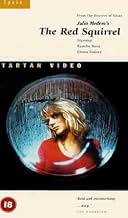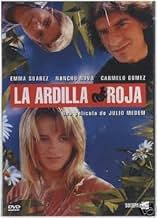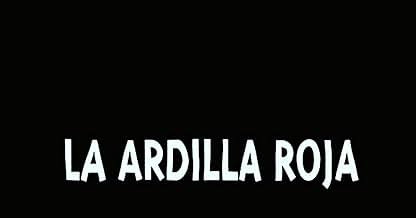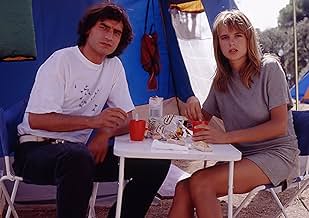AVALIAÇÃO DA IMDb
7,1/10
5 mil
SUA AVALIAÇÃO
Um astro do rock suicida e ex-futuro diz a uma mulher amnésica que eles são amantes de longa data depois que ele a testemunha batendo sua motocicleta.Um astro do rock suicida e ex-futuro diz a uma mulher amnésica que eles são amantes de longa data depois que ele a testemunha batendo sua motocicleta.Um astro do rock suicida e ex-futuro diz a uma mulher amnésica que eles são amantes de longa data depois que ele a testemunha batendo sua motocicleta.
- Direção
- Roteirista
- Artistas
- Prêmios
- 12 vitórias e 5 indicações no total
Susana García Díez
- Eli
- (as Susana García)
Avaliações em destaque
Having seen Julio Medem's "Vacas", I was familiar with the directors style, humour and pace. Although in an entirely different setting, this film does share some of these traits.
I did enjoy watching this film, and was intrigued from beginning to end - I found the two main characters particularly interesting. However, I don't think it all holds together. The mystery and suspense behind Lisa's past is built up falsely - it certainly was not a major shock in the end as it had been pointed to frequently in the course of the film. A few questions regarding her past still remain unanswered at the end.
Of course, these are criticisms of the plot - and not of the film as a whole. Yet this film was a plot driven one, the revelation not as earth-shattering as Julio Medem had probably intended. As for romance...? I find Jay's pretenses and "Lisa's" actions little ground for true romance.
I hope I am not being too critical - perhaps I was expecting more to be resolved. I would certainly not like to put anyone off seeing this film. It was wonderfully filmed and I am sure I will have a look at it again, but in the end, I believe it is an inferior work to Julio Medem's earlier film, "Vacas".
I did enjoy watching this film, and was intrigued from beginning to end - I found the two main characters particularly interesting. However, I don't think it all holds together. The mystery and suspense behind Lisa's past is built up falsely - it certainly was not a major shock in the end as it had been pointed to frequently in the course of the film. A few questions regarding her past still remain unanswered at the end.
Of course, these are criticisms of the plot - and not of the film as a whole. Yet this film was a plot driven one, the revelation not as earth-shattering as Julio Medem had probably intended. As for romance...? I find Jay's pretenses and "Lisa's" actions little ground for true romance.
I hope I am not being too critical - perhaps I was expecting more to be resolved. I would certainly not like to put anyone off seeing this film. It was wonderfully filmed and I am sure I will have a look at it again, but in the end, I believe it is an inferior work to Julio Medem's earlier film, "Vacas".
10Phroggy
Yours truly has seen lots and lots of movie, but very few impressed me with sheer intelligence as this one - a gem where you feel every single shot has its real meaning and, more important, the filmmaker think his audience is clever enough to understand what's going on without having it rammed in his/her face. When you only know the title and doesn't know a thing about the plot (as I did when I saw this one at the Gérardmer film festival), you feel stunned, aghast, thrilled, surprised, and then you settle for the ride. Comedy, wit, intelligence (again), romance, mystery, emotion, this one has everything that makes us love movie. Unless you only want special effects and billion-dollars no-brainers, I can't see how this movie can fail to ignite passion. If there actually is justice in this world, Julio Medem will someday be recognised as maybe the most underrated filmmaker of our times - and he hasn't said his last word yet. A masterpiece to be enjoyed again
and again
and again
Julio Medem is something of an underrated figure within the spectrum of world cinema. He regularly produces bold, imaginative and exciting films that shatter the usual preconceptions we might have of the limitations of cinematic language and storytelling in the visual sense, as well as presenting an incredibly intelligent and original approach to the ideas of production design, editing and cinematography. Despite this, however, he has yet to be fully acclaimed universally as a great filmmaker in the tradition of Tarkovsky, Bergman, Hitchcock, Kubrick, Godard, Welles etc - or even ranked alongside contemporary cinematic figures such as Pedro Almodóvar, Lars von Trier, Aki Kaurismäki, Michael Haneke and Guillermo Del Toro. The Red Squirrel (1993) was only Medem's second feature following the elliptical historical satire Vacas (1991) and yet, even now we can already see the themes from that particular film being further developed in preparation for the later, perhaps even great films, such as Tierra (1996), The Lovers of the Arctic Circle (1998) and Sex and Lucia (2001).
Like those films, The Red Squirrel is a multi-layered work rife with possible interpretations and elements of broad, Buñuelian surrealism that are at odds with the more recognisable presentation of reality established in the film's intriguing first half. On our initial viewing the plot can seem incredibly straightforward, revolving around the strange relationship between a suicidal former pop star and the mysterious, amnesiac woman who literally falls into his life. With this section of the film, Medem creates a truly unique modern-day thriller, building on elements of Hitchcock - most noticeably Vertigo (1957), with its iconographical depictions of mysterious blondes, shadowy villains, damaged heroes and seething paranoia - but intelligently subverting them by way of elements as diverse as Salvador Dali, the aforementioned Buñuel, low-budget B-movies, The Road Warrior (1980), elements of magical realism and ideas central to the Basque regional identity; again, drawing parallels with the hypnotic and self-reflexive world of Vacas. These subtle editions compliment the more recognisable characteristics of the romantic-thriller mystery story at the heart of the film to create something that is much more engrossing, enticing, and unique.
As the story progresses and we are drawn ever deeper into the film's central mystery, we begin to note the emergence of further plot influences, such as psychological horror, melodramatic eroticism, heart-stopping suspense, black comedy and eventually full-blown surrealism. As it does, the film then becomes much more complex, taking on issues of love, sexuality, mental and physical manipulation, mind-games and cinematic role-playing. Medem ties the whole thing together with some wonderful set pieces and a staggering use of cinematic style put together on an obviously limited budget. It isn't purely the imagination and intelligence of Medem that impresses us though; with every wild narrative U-Turn or directorial flourish - incorporating everything from Kiss Me Deadly (1955) to Raising Arizona (1987) - being backed up by the fine performances from lead actors Nancho Novo and Emma Suárez, both of whom manage to makes us care an enormous amount about these two protagonists and the relationship that forms between them.
Although it's always tempting to say that both Medem and his work is unlike anything else you will ever see; I think there are some obvious reference points here, many of which have been mentioned above, as well as a certain similar approach to filmmakers such Krzysztof Kieslowski - with the deep, meditative and vaguely hypnotic use of camera combined with the intricate presentation of a narrative driven by the purely psychological; most apparent for example in his epic TV series Dekalog (1989) and one of his greatest films, The Double Life of Veronique (1991) - and especially a filmmaker like Wong Kar-Wai, with the idea of the lead character's enigmatic pop song describing the narrative and the central location manipulating the story so as to take on more self-reflexive, metaphorical notions being very much in keeping with films such as like Happy Together (1997), In the Mood for Love (1999) and 2046 (2004).
As with much of Medem's work, including the 2001 erotic mystery thriller Sex and Lucia, the film uses much in the way of cinematic coincidences, with the various coincidences that form the basis of the plot acting as clues to the narrative. This turns the film into a wonderful example of cinematic storytelling, creating a real mystery for the audience in which all the pieces fall perfectly into place during the film's final act, but still leave us room for interpretation. Without question, this is a delightful cinematic experience that goes way beyond the limitations of film; elaborating on some of the complex ideas regarding narrative, time, character and spirit presented in Vacas, whilst simultaneously foreshadowing the ideas of escape, transcendence, imagination, eroticism and the notion of a story being written as it goes, which will all be further developed in Sex and Lucia. With this in mind, The Red Squirrel is an absolute marvel; an epic, ornate jigsaw-puzzle for the audience, and - without question - one of the greatest films of the 1990's.
Like those films, The Red Squirrel is a multi-layered work rife with possible interpretations and elements of broad, Buñuelian surrealism that are at odds with the more recognisable presentation of reality established in the film's intriguing first half. On our initial viewing the plot can seem incredibly straightforward, revolving around the strange relationship between a suicidal former pop star and the mysterious, amnesiac woman who literally falls into his life. With this section of the film, Medem creates a truly unique modern-day thriller, building on elements of Hitchcock - most noticeably Vertigo (1957), with its iconographical depictions of mysterious blondes, shadowy villains, damaged heroes and seething paranoia - but intelligently subverting them by way of elements as diverse as Salvador Dali, the aforementioned Buñuel, low-budget B-movies, The Road Warrior (1980), elements of magical realism and ideas central to the Basque regional identity; again, drawing parallels with the hypnotic and self-reflexive world of Vacas. These subtle editions compliment the more recognisable characteristics of the romantic-thriller mystery story at the heart of the film to create something that is much more engrossing, enticing, and unique.
As the story progresses and we are drawn ever deeper into the film's central mystery, we begin to note the emergence of further plot influences, such as psychological horror, melodramatic eroticism, heart-stopping suspense, black comedy and eventually full-blown surrealism. As it does, the film then becomes much more complex, taking on issues of love, sexuality, mental and physical manipulation, mind-games and cinematic role-playing. Medem ties the whole thing together with some wonderful set pieces and a staggering use of cinematic style put together on an obviously limited budget. It isn't purely the imagination and intelligence of Medem that impresses us though; with every wild narrative U-Turn or directorial flourish - incorporating everything from Kiss Me Deadly (1955) to Raising Arizona (1987) - being backed up by the fine performances from lead actors Nancho Novo and Emma Suárez, both of whom manage to makes us care an enormous amount about these two protagonists and the relationship that forms between them.
Although it's always tempting to say that both Medem and his work is unlike anything else you will ever see; I think there are some obvious reference points here, many of which have been mentioned above, as well as a certain similar approach to filmmakers such Krzysztof Kieslowski - with the deep, meditative and vaguely hypnotic use of camera combined with the intricate presentation of a narrative driven by the purely psychological; most apparent for example in his epic TV series Dekalog (1989) and one of his greatest films, The Double Life of Veronique (1991) - and especially a filmmaker like Wong Kar-Wai, with the idea of the lead character's enigmatic pop song describing the narrative and the central location manipulating the story so as to take on more self-reflexive, metaphorical notions being very much in keeping with films such as like Happy Together (1997), In the Mood for Love (1999) and 2046 (2004).
As with much of Medem's work, including the 2001 erotic mystery thriller Sex and Lucia, the film uses much in the way of cinematic coincidences, with the various coincidences that form the basis of the plot acting as clues to the narrative. This turns the film into a wonderful example of cinematic storytelling, creating a real mystery for the audience in which all the pieces fall perfectly into place during the film's final act, but still leave us room for interpretation. Without question, this is a delightful cinematic experience that goes way beyond the limitations of film; elaborating on some of the complex ideas regarding narrative, time, character and spirit presented in Vacas, whilst simultaneously foreshadowing the ideas of escape, transcendence, imagination, eroticism and the notion of a story being written as it goes, which will all be further developed in Sex and Lucia. With this in mind, The Red Squirrel is an absolute marvel; an epic, ornate jigsaw-puzzle for the audience, and - without question - one of the greatest films of the 1990's.
The Spanish version of Vertigo, this story is more than meets the eye. The plot if very much one sided. Although you do great a nice switch at the end of the movie, the journey getting there is better. A sweet ending with not much to it, the audience is given a happy ending like in much fiction. Emma Suarez is amazing. She steals every scene with her seduction. From the start of the movie, it appears that Emma plays the victim. As the story unfolds, she becomes the aggressor in more ways than one.
'The Red Squirrel' starts off like a Hitchcockian thriller, but soon becomes more complex and difficult to categorize. By the end of this utterly fascinating movie I would be hard pressed to label it. "A mystery" and "a love story" don't give you the whole picture. Just see it for yourself if you want something challenging and original. I know nothing about writer/director Julio Medem, but after watching this film I will rectify that as soon as possible! The basic plot is fairly simple - a washed up pop star contemplates suicide. Before he can do so he witnesses a road accident, a motorbike crash. A young girl is injured slightly but appears to be amnesiac. On the spur of the moment he tells her that he is her boyfriend and invents a name for her (Lisa, his ex-girlfriend, who he still loves). He visits her as she recuperates in hospital, and as it looks more and more likely that he will be found out, he smuggles her out and takes her on a camping holiday. Then things get a bit strange... The plot as I said is fairly simple, but the movie is not. I was hooked from the opening scenes and was fascinated until the very end. I really enjoyed this movie and highly recommend it.
Você sabia?
- CuriosidadesStanley Kubrick was such a fan of the film, he purchased Julio Medem's own personal print.
- ConexõesReferenced in Brows Held High: Room in Rome (2013)
Principais escolhas
Faça login para avaliar e ver a lista de recomendações personalizadas
- How long is The Red Squirrel?Fornecido pela Alexa
Detalhes
- Data de lançamento
- País de origem
- Central de atendimento oficial
- Idiomas
- Também conhecido como
- The Red Squirrel
- Locações de filme
- Empresa de produção
- Consulte mais créditos da empresa na IMDbPro
- Tempo de duração1 hora 54 minutos
- Cor
- Mixagem de som
- Proporção
- 1.85 : 1
Contribua para esta página
Sugerir uma alteração ou adicionar conteúdo ausente

Principal brecha
By what name was O Esquilo vermelho (1993) officially released in India in English?
Responda






























